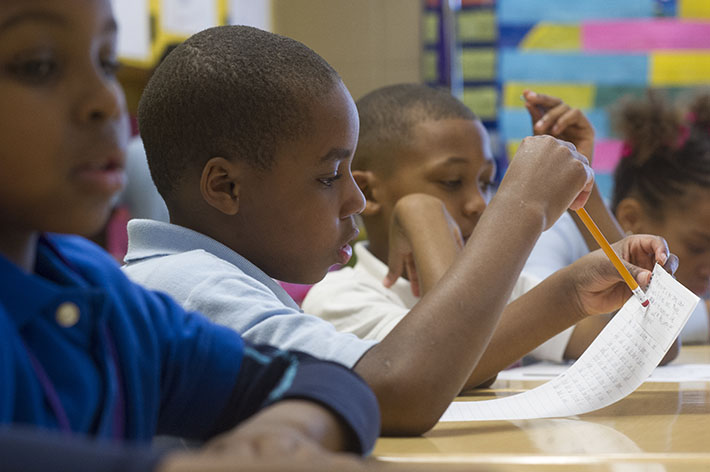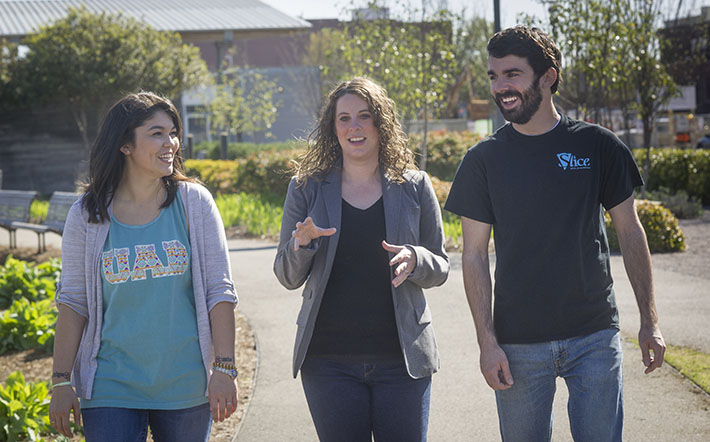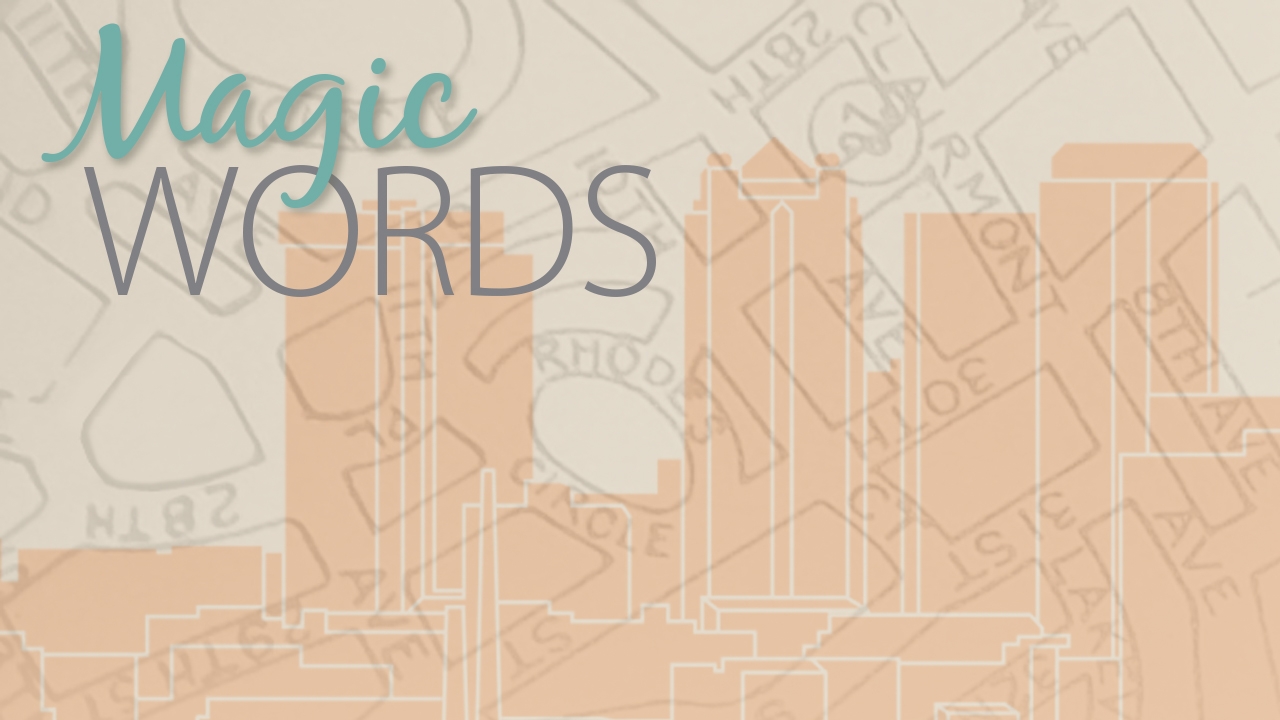The city of Birmingham is an open book for students in one UAB English course. It serves as both subject and setting for their work, which hones their skills for writing about place for different public and academic audiences. And they quickly find that Birmingham’s story has plenty of blank pages for them to fill.
“Birmingham is a city that sparks a lot of opinions,” says Jaclyn Wells, Ph.D., the assistant professor of English who teaches the course, appropriately titled Writing in Birmingham. “I want to take advantage of that.” In their own words, students discover the hidden gems and little-known history of the Magic City they call home. They also get an opportunity to help shape Birmingham’s future by working with some of its youngest residents.
“Birmingham is a city that sparks a lot of opinions,” says Jaclyn Wells, Ph.D., the assistant professor of English who teaches the course, appropriately titled Writing in Birmingham. “I want to take advantage of that.” In their own words, students discover the hidden gems and little-known history of the Magic City they call home. They also get an opportunity to help shape Birmingham’s future by working with some of its youngest residents.
The Power of Place
The course gave Wells, who also directs UAB’s Writing Center, her own introduction to Birmingham after arriving from Indiana in 2012. Given her interest in place-based writing, she taught the class for the first time that fall semester. Quickly, she discovered that her limited knowledge of her new hometown was more benefit than drawback. The subject matter kept her motivated and curious alongside her students. Her newcomer status also was a boon to her students’ writing process: “They had a real audience,” she says, “a teacher who didn’t know too much about the city.”
Too often, Wells reflects, students feel they have nothing to write about when they start the course. Place-based writing “taps into what they see around them, and they realize how much they have to say,” she says. “The class gives their writing a real sense of purpose.” The nature of the assignments allows students to practice writing for varied audiences, a critical skill in almost any career they pursue. And the city’s relatively small size—not to mention UAB’s in-town campus—makes it easy for students to explore their community.
For their first foray into the city and its culture, students select a local place of interest, visit the location several times, and profile it in writing. Railroad Park has been a popular destination, although last semester, Wells’s 15 students wrote about a diverse smattering of sites, from the Lyric Theatre and Legion Field to the Southern Museum of Flight, Good People Brewing Company, and the Bottletree restaurant/music venue. In a follow-up assignment, students interview a Birmingham citizen, often an individual associated with the place they’ve explored.
Students also engage with the local community through the course’s service-learning project, Young Writers in Birmingham. For several weeks they visit Inglenook Elementary, a Birmingham public school, and guide third and fourth graders through creative writing assignments. The project concludes with a celebration at the Woodlawn branch of the Birmingham Public Library, and the children’s writing is collected and printed in an anthology.
Too often, Wells reflects, students feel they have nothing to write about when they start the course. Place-based writing “taps into what they see around them, and they realize how much they have to say,” she says. “The class gives their writing a real sense of purpose.” The nature of the assignments allows students to practice writing for varied audiences, a critical skill in almost any career they pursue. And the city’s relatively small size—not to mention UAB’s in-town campus—makes it easy for students to explore their community.
For their first foray into the city and its culture, students select a local place of interest, visit the location several times, and profile it in writing. Railroad Park has been a popular destination, although last semester, Wells’s 15 students wrote about a diverse smattering of sites, from the Lyric Theatre and Legion Field to the Southern Museum of Flight, Good People Brewing Company, and the Bottletree restaurant/music venue. In a follow-up assignment, students interview a Birmingham citizen, often an individual associated with the place they’ve explored.
Students also engage with the local community through the course’s service-learning project, Young Writers in Birmingham. For several weeks they visit Inglenook Elementary, a Birmingham public school, and guide third and fourth graders through creative writing assignments. The project concludes with a celebration at the Woodlawn branch of the Birmingham Public Library, and the children’s writing is collected and printed in an anthology.
 Inglenook Elementary students work on a creative writing project as part of the Young Writers in Birmingham initiative.
Inglenook Elementary students work on a creative writing project as part of the Young Writers in Birmingham initiative.
Letters to the Future
When Taylor Suttle, a communications management major from Moody, Ala., heard about the service-learning project at the beginning of class, she wondered what she had gotten herself into. She had little experience with kids.
To her surprise, Suttle found that working with the Inglenook students was the highlight of the course, which she has recommended enthusiastically to her UAB peers. “Those students taught me so much,” she says. “The class made me a more well-rounded student, and it has helped me understand how to look for the little details that not everyone sees.”
Another student, Jay Haywood, also approached the project “kind of on the defensive.” The education major had little knowledge about the area of Birmingham where Inglenook Elementary is located. But the experience left him not only more eager to teach, but also interested in working in the Birmingham city schools. “The kids are really engaged and they want to learn,” he observes. “I always thought I wanted to be an educator, but this showed me how gratifying it can be.” Haywood especially enjoyed helping the students compose letters to themselves 20 years from now. “One little guy ended up with 1,000 dogs,” he says. “They were all looking forward to going to college.” He read eye-opening letters, too: One girl wrote that she hoped to go to college to learn how to work two jobs that many people would consider menial.
Just as Wells intended, writing about Birmingham has inspired her students to get involved in the community after they finish the course. That has certainly been the case for 2014 graduate Amy Roberts, who has accepted a job with Growing Kings, a nonprofit that works with underserved male youth in the Birmingham city schools. Roberts says she never would have received the job offer had she not taken Wells’s course and mentioned her experience with the Young Writers in Birmingham project in her interview.
“Prior to this class, I was far from enthusiastic about this city,” says Roberts, who grew up in the Atlanta suburb of Lilburn, Ga., and initially thought of Birmingham as a “city that could fit into my pocket.” But the course “got me into the city in a way I never thought I would,” she says. “I got to work in the community with the people. It really pushed me to learn more about Birmingham’s past and its potential for the future.”
To her surprise, Suttle found that working with the Inglenook students was the highlight of the course, which she has recommended enthusiastically to her UAB peers. “Those students taught me so much,” she says. “The class made me a more well-rounded student, and it has helped me understand how to look for the little details that not everyone sees.”
Another student, Jay Haywood, also approached the project “kind of on the defensive.” The education major had little knowledge about the area of Birmingham where Inglenook Elementary is located. But the experience left him not only more eager to teach, but also interested in working in the Birmingham city schools. “The kids are really engaged and they want to learn,” he observes. “I always thought I wanted to be an educator, but this showed me how gratifying it can be.” Haywood especially enjoyed helping the students compose letters to themselves 20 years from now. “One little guy ended up with 1,000 dogs,” he says. “They were all looking forward to going to college.” He read eye-opening letters, too: One girl wrote that she hoped to go to college to learn how to work two jobs that many people would consider menial.
Just as Wells intended, writing about Birmingham has inspired her students to get involved in the community after they finish the course. That has certainly been the case for 2014 graduate Amy Roberts, who has accepted a job with Growing Kings, a nonprofit that works with underserved male youth in the Birmingham city schools. Roberts says she never would have received the job offer had she not taken Wells’s course and mentioned her experience with the Young Writers in Birmingham project in her interview.
“Prior to this class, I was far from enthusiastic about this city,” says Roberts, who grew up in the Atlanta suburb of Lilburn, Ga., and initially thought of Birmingham as a “city that could fit into my pocket.” But the course “got me into the city in a way I never thought I would,” she says. “I got to work in the community with the people. It really pushed me to learn more about Birmingham’s past and its potential for the future.”
 Jaclyn Wells (center) helps students, including Amy Roberts (left) and Jay Haywood (right), find their voices and explore their city through place-based writing.
Jaclyn Wells (center) helps students, including Amy Roberts (left) and Jay Haywood (right), find their voices and explore their city through place-based writing.
The Written CitySpotlights on Student Work from the Writing in Birmingham Course"Our four short visits to Inglenook had so many touching moments it is hard to fit them all on a piece of paper. Several of the students in my group wanted to be police officers so they could help people. One girl wrote about how she was going to be the president, a singer, and a science teacher all while having a family of her own. Spending time with these kids reminded me that no dream is ever too big, and that you always have to have goals. "Possibly the most important thing I learned on this journey was how to be a carefree kid again. The kids had the most contagious carefree attitudes. Their writing reminded me that sometimes it’s important just to sit down, close your eyes, and imagine. Our imaginations are one of the greatest gifts we have. They were also confident in their writing and ideas. I never noticed one kid who appeared embarrassed to write whatever they were thinking, and when they finished they wanted everyone to read it. They taught me to be proud of my work." —Taylor Suttle, Excerpt from “Reflection on Volunteering at Inglenook Elementary" "After graduating from FAMU he moved to Charlotte with one of his drum line brothers and started working for a firm making $75,000 a year. 'Plenty money made. No responsibilities, really. Life, but no children. No wife. No girlfriend. Just enjoying… myself,' Marcus laughed as he looked back on his former lifestyle. But as his laugh slowly faded to a silence, he paused, and his story immediately took a turn. "'I started feeling unfulfilled. It was more like, there was more that I could be doing than crunching numbers, doing financial analysis, and forecasting and building models, you know. It just. I didn’t see myself always doing that.' Marcus talked about a song by a rapper whose name I knew only vaguely. Just as I finished jotting down the artist’s name and song title he began reciting a verse. . . . "His eyes lit and he sat up in his chair, 'And from that, I was like, this is what I need to be doing. You know what I’m sayin’? It was like, I need to be showin’ these little dudes what their father’s not showin’ them. I had the background because I come from where they come from. It’s nothin’ different about what they live through and what I lived through. And, I know that difference was my father.'" —Amy Roberts, Excerpt from “Marcus Carson: A Son of the City" |


